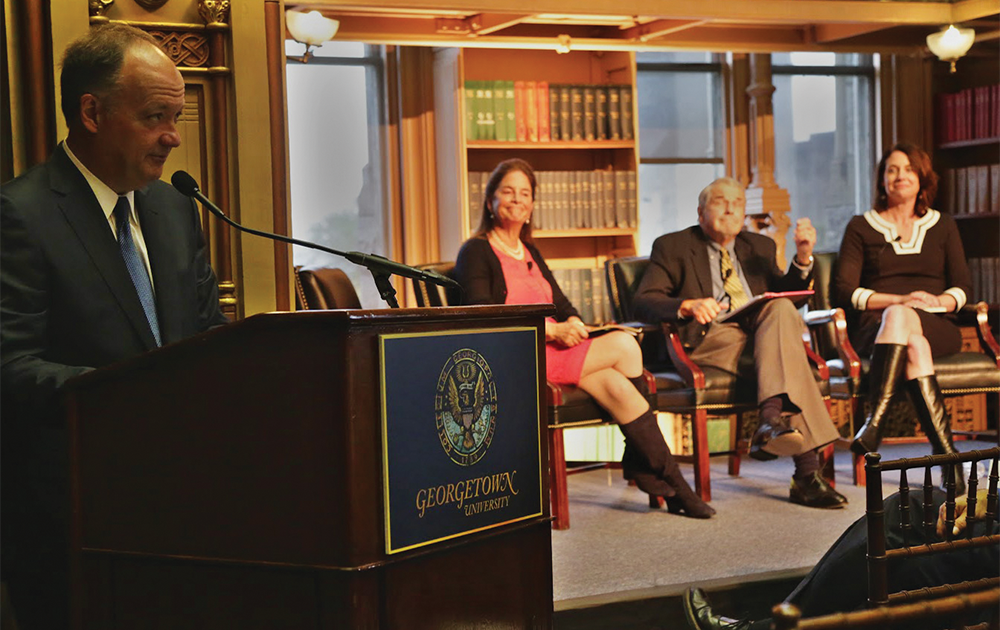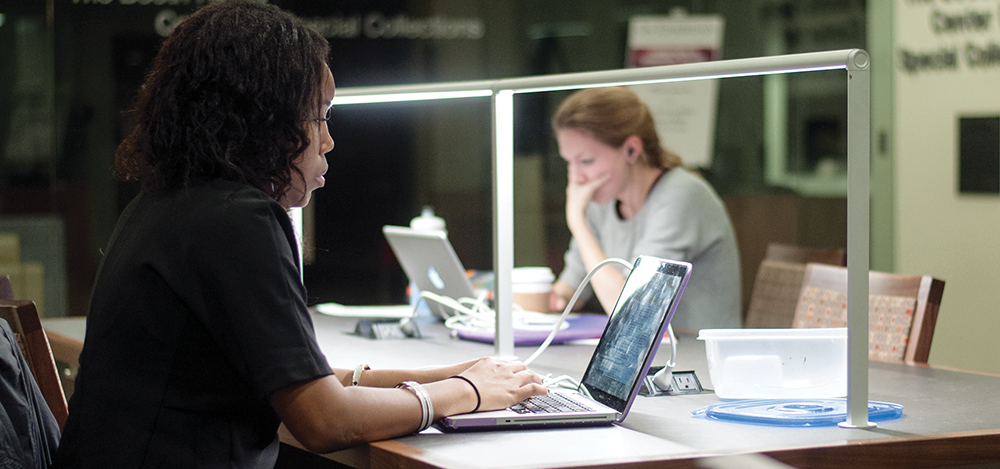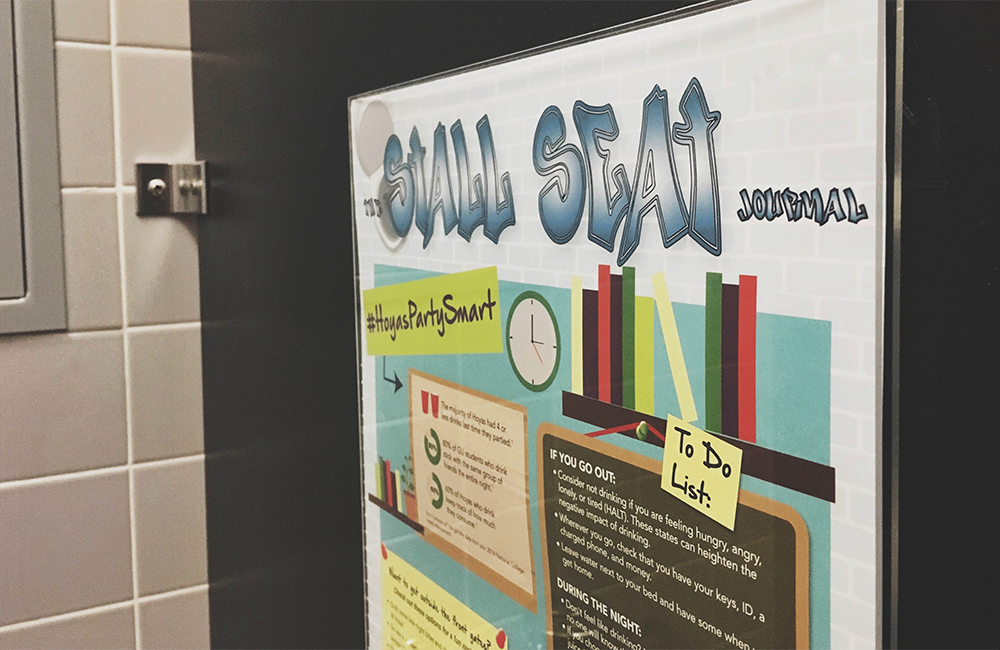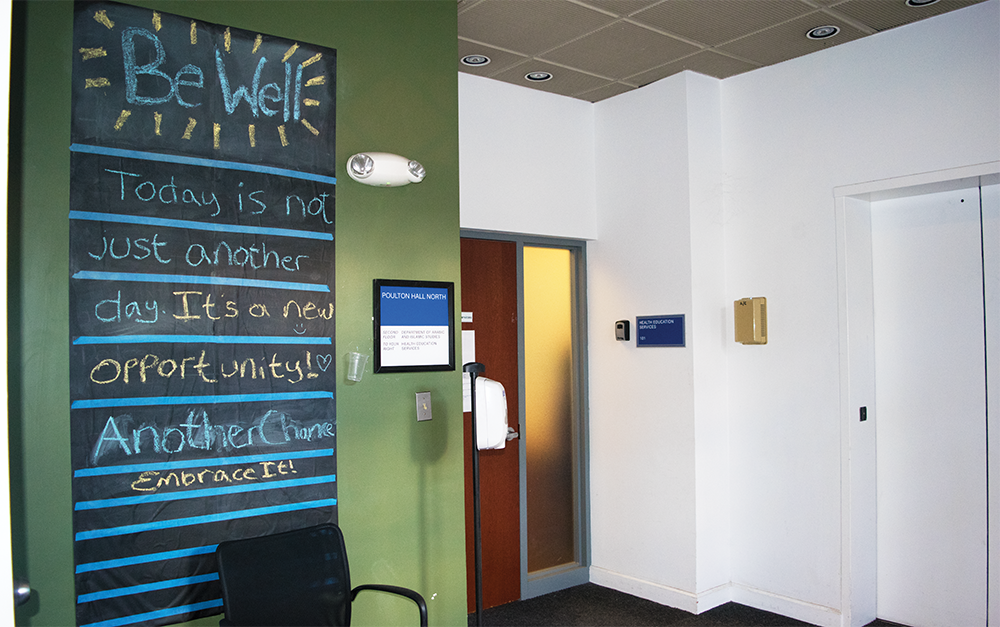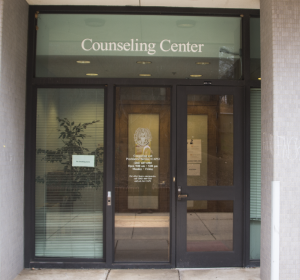
Located in back of Darnall Hall, the Counseling Center provides psychological and psychiatric services to all Georgetown students.
Seeking information pertaining to eating disorders on campus, The Hoya held separate interviews with Carol Day, the director of Health Education Services and member of the adjunct faculty of Health Studies and Human Science, and Mary Quigley, the staff clinical social worker and eating disorder specialist. In this combined version of those conversations, Day and Quigley share their perspectives concerning the health of Georgetown students and attempt to make others aware of how to handle similar situations.
For which kinds of body image problems and eating disorders do you see Georgetown students to be most at risk?
Mary Quigley: I think students are at risk of getting too thin; you know, being more on the restrictive side and over-exercising because they’re trying too hard to be perfect. The girls I see divide up into being on the anorexic end or the binging end. They’re binging and purging by inducing it or over-exercising. I think there’s been an increase in people with binge eating disorders. Even though you can notice anorexia on campus, in reality, it’s really only one or two percent of the college population.
Carol Day: Body image is an issue for all young women, particularly college women; it is a time when they are sensitive adolescents. People try to micromanage, probably to a fault. This is a little truer of Georgetown students because they are perfectionistic, and everyone wants to be above average. That sometimes gets translated into micromanaging food and exercising.
What are the factors that bring about these issues, specifically on a college campus or Georgetown’s campus, and would you say they usually develop prior to one’s college years, or are certain students entering college more prone to these kinds of health risks?
Quigley: Certain people come in more prone to it. I see a few people — like 10 percent — develop it here based on competition or thinking that they’re not good enough. But the majority of people I see come in have a relapse; they had it before in high school, or they had these issues of wanting to lose weight as a way to control anxiety or pressures.
Day: Women are susceptible; men are increasingly susceptible, and there is a lot of celebrity admiration and media misrepresentation of people. There is some misinformation on what fitness actually is, and people with varying body types can be very physically fit if they are exercising. The research says that it develops quite young, around six to nine years old, beginning to think that they are too big and will be considered fat. There is a lot of size-ism that happens at a young age.
How does CAPS try to reach out and connect to the student body about these issues?
Quigley: We advertise an eating disorder group every semester to everyone, inviting them to join the group if they have interest. We do training for RAs every summer, and part of our roleplaying is usually with a student with an eating problem. We train them on how to be sensitive, what to say, how to approach somebody. Other than that, I think it’s by self-referral or referral by Carol Day, the nutritionist. Mostly, people self-identify or their roommates are worried about them, and they know to go to CAPS.
Day: Not associated with CAPS, but under Student Affairs, I co-chair a group with Mary Quigley, a clinician in the Student Health Center, and it’s a body support group talking about image concerns and the stress of eating healthy. So, back to your question about peer support. Next week we are getting ready to have a body image Health Hut; we are encouraging people to look beyond the pressure to be super thin.
What are the physical and social signs that someone has an eating disorder?
Quigley: With anorexia, you’ll notice when someone loses a lot of weight fast. Sometimes people lose weight drastically until you can tell. It’s hard to tell when someone’s naturally thin, but I think you can tell if you knew someone three months ago, and they’ve lost a lot of weight. You might notice a friend talking in the hallway about food and dieting all the time. And you would see maybe patterns in what they ate — maybe they’re only eating a salad every night. You would notice behaviors with eating, physical looks, weight loss and you probably could tell if someone is preoccupied with food.
Day: The ones that are most obvious are if you are really too low in weight — another reason why that might be the case is if you are underweight and struggling with anorexia. Other than that, people are often struggling with another disorder, such as bulimia, throwing up after you eat, over-exercising response; those things are harder to know. You might know more because you are living with someone who eats out of control from time to time, or in an isolated fashion; it can be hard to gauge. Other people might be struggling with ongoing things, like they don’t like the way their body looks, [which is] often a sign that their happiness depends on their body image. Sometimes people eat or overeat — the struggle is purging the food after — and take frequent bathroom trips after that. Having food disappear from a household or noticing things like people disappearing and eating are all signs.
How does a friend approach someone they believe is dealing with an eating disorder?
Quigley: Approach a friend very carefully because people are embarrassed that they have the problem. Most people are going to be on the defensive — you don’t want to look like you have problems. You have to approach very gently, and say, “I’m a little worried about you; I’ve noticed you lost a lot of weight this semester; I feel like I never see you eating anymore; I noticed you’re always going to the gym.” Just be forthright. I think you describe the behaviors, or you describe the physical changes — so you base it in facts rather than “I think you have a problem.”
Day: Typically one-on-one, “How are you doing; here is what I’ve noticed; I had a friend in high school who struggled with anorexia; You might be having a problem, do you want to talk to somebody about it?” Quietly, gently, one-on-one voice a concern. The worst thing to do is get together as a group and have a conversation, like five-on-one.
Do you have anything to add for students about mental health, CAPS or anything else?
Quigley: I would hope people don’t feel so much stigma and that we continue, as a campus, to be more open about it and more accepting of all body types — but we’re not really. Competition and perfectionism are issues that a lot of students face and some people may manifest it in an eating problem. A lot of people are prone to have vulnerability about being perfect, so I think addressing that issue and managing stress are good ways to include eating disorders. I think it’s similar to other problems that people have, like studying all night or having to get an A. People are really multi-talented here, and I think that’s hard — you think everybody else is doing more than you are. I’m open to the idea of more forums about what kids face psychologically on campus. I think it goes in many directions — it’s all under an umbrella of “I want to be the perfect person.” Everyone has something going on here. I wish that people didn’t feel so ashamed and secretive about them.
Day: Eating disorders and disturbances are pretty common and can develop because of things in someone’s past. There is no one reason, and often people will encounter things that drive them down that path. They did not choose to have an eating disorder. It can be subtle and subclinical, but not really diagnosable. Proactively, if people are reading the article, think they might have a problem and want to talk to someone about the issue, it’s a good time to have a conversation. I am here for that; the Counseling Center is here for that — everyone’s a health professional. If you come in and talk to someone in CAPS, it’s confidential. And no charge for the first services — friends want to talk about someone else — or your own issues. [There’s] no judgment — [it’s] totally neutral, confidential and private. So what we know from research is people spend a while thinking it might be a problem before it’s enough of a problem to seek help.


